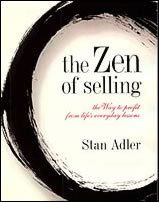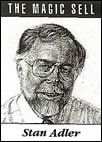The following article featuring Brad originally appeared in an electronic sales magazine in February of 1994. It eventually was re edited and used as a chapter in the book called "The Zen of Selling", by Stan Adler.
Consultive Selling & How It Can Work For Retailers
Brad was a craftsman, and he specialized in doors. Carrie, my wife, met Brad when she was researching the possibility of a new front door, something we had promised ourselves for the past 15 years but for some reason had always put off.
Carrie was almost ready to put it off again. Whenever she asked about front doors, the salesperson asked who her contractor was or handed her a brochure. It seemed that any information that pertained to an end user's specific needs was either a trade secret or so sublime that it needed the stewardship of a licensed professional. She was repeatedly brushed off, talked down to, patronized, and generally discouraged. Keep her in the dark, and maybe she'll disappear seemed to be the door seller's policy.
Then one day, while shuffling through some hinged samples, someone notice her bored and bewildered expression. A young, red-headed, energetic man with a smile said, "You look confused, could you use some help?" Carrie came out of her shopper's stupor and nodded yes. Brad gave her his card and offered to drop by the house to talk about front doors.
He didn't know that he was a consultant building a partnership with a client, but he was.
When Carrie told me this, I thought, how much is there to talk about? Brad answered my question the next day. According to Brad, the front door is one of the most important features of the house. "It's the first thing a visitor sees when the come to your house," he said. "It tells a lot about how a person feels about their house."
He shook his head with dismay as he went on: "Some people will spend thousands of dollars remodeling their entryway and then have their neighbor put on the door. I don't know, I don't understand. I guess that's all right. Some people don't care about quality, and hey, that's all right. But if you do care, you need to have the right door."
Since we did care, we learned about manufactured doors, custom-made doors, different woods and grains, mortise locks, trim, appropriateness of different styles, how to care for the exterior of a finely crafted door, and a "believe it or not" item, how driving rain can actually penetrate a door because of floating panels that are used in the construction of most front doors.
He outlined main considerations and concerns, telling us that these were things that we must decide on because it was our door. When Carrie and I asked him to make decisions for us, he refrained and told us that the decision was personal and should be ours. He would give well-informed input attuned to our personal considerations (which we had shared with him), but he would not make our decision.
Rather than regarding time as a loophole which the customer would use to talk themselves out of a sale, he took time to facilitate a dialogue that would reinforce both his and our credibility.
We almost begged him to tell us whether to go with a lever or a knob for the interior. With a pleasant but serious smile, he said, "No, you decide."
A month later, after the door was hung and the hardware installed, we mentioned the option of the lever. He told us that the knob which we had chosen was beautiful. I never knew which he preferred, but I do know that Carrie and I felt that our decision had been a good one. It was very clearly the difference between buying something and being sold something.
This is not to insinuate any lack of assertiveness on Brad's part. He told us he was "eager" to do the job, but he would have to do it right or not do it at all, "because you're going to be living with this door for the rest of your life, am I right?" He waited for our answer. We said "Yes," and bought it.
He didn't know that he was a consultant building a partnership with a client, but he was. He didn't know about a five-step selling cycling or quantifying solutions, but he was a role model of consultive selling.
Most important, he understood four main things that acted as guidelines for his excellent performance.
• The first thing was his willingness to assist a person and invest time in the creation of a purchase even when there were no obvious initial buying signs. This takes intuition and guts.
• The second was recognizing the paramount important of a customer's individual needs and tastes relative to the product. How much time did it take to make a sale? Answer: Enough time to personalize it.
• The third quality was his enjoyment of his work, and his ability to share that enjoyment with the customer.
When you are really good at something, you usually enjoy it, whether it's selling, hanging doors, playing music or climbing mountains. The more you enjoy it, the more your customer will enjoy it. Customers tend to identify with the products they have decided to buy; their early participation in the process makes them part and parcel of the purchase.
• The fourth thing was Brad's knowledge of his product and craft. This means plenty of research, thorough preparation and exacting attention to detail.
We had chosen bronze-toned hardware for the outside and polished brass hardware for the inside. So, Brad asked, did we want a bronze or brass peephole? As I looked at the little shiny brass tube in his palm, I was thinking that I actually wanted it to be bronze on the outside and brass on the inside. Before I had a chance to verbalize a seemingly unreasonable request, he reached in his pocket, took out a bronze peephole, combined the two and gave me my druthers.
He smiled, knowing he had exceeded my expectations.
There was something else about Brad that was more encompassing – call it pride, integrity… recognition of one's own excellence. A kind of performance standard.



